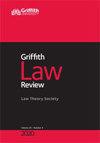Extinction, law and thinking emotionally about invertebrates
IF 0.9
Q1 LAW
引用次数: 2
Abstract
ABSTRACT The extinction of a species can provoke deep feelings of sadness, injustice, compassion and empathy for the individuals lost. In this paper we argue that law, as a governance institution, does not allow decision-makers the use of emotions such as compassion or empathy, when making decisions relevant to the possible extinction of species, despite evidence to suggest that such emotions elevate the importance of moral concerns, and so may be utilised to halt the extinction process. Further, we argue that law can impact our ability to feel compassion and empathy for species heading towards extinction, as it creates a narrative of apathy. This is particularly exacerbated when it comes to the potential extinction of invertebrates, whose needs and interests are often already subject to people’s negative emotional pre-dispositions. By analysing the recent legal decisions surrounding the approval of the Yeelirrie Uranium mine in Western Australia, we highlight the nature of this problem and what it means for the conservation of invertebrate species, and argue that environmental law’s commitment to utilitarian and rational traditions will continue to challenge how we react to, and allow, the extinction of invertebrate.灭绝,法律和对无脊椎动物的情感思考
一个物种的灭绝会激起人们深深的悲伤、不公、同情和同情。在本文中,我们认为法律,作为一个治理机构,不允许决策者在做出与物种可能灭绝相关的决定时使用情感,如同情或同理心,尽管有证据表明,这种情感提升了道德关注的重要性,因此可以用来停止灭绝过程。此外,我们认为法律可以影响我们对濒临灭绝的物种的同情和同情,因为它创造了一种冷漠的叙述。当涉及到无脊椎动物的潜在灭绝时,这种情况尤其加剧,因为无脊椎动物的需求和兴趣往往已经受到人们消极情绪倾向的影响。通过分析最近围绕批准西澳大利亚Yeelirrie铀矿的法律决定,我们强调了这个问题的本质及其对无脊椎动物物种保护的意义,并认为环境法对功利主义和理性传统的承诺将继续挑战我们如何应对和允许无脊椎动物的灭绝。
本文章由计算机程序翻译,如有差异,请以英文原文为准。
求助全文
约1分钟内获得全文
求助全文

 求助内容:
求助内容: 应助结果提醒方式:
应助结果提醒方式:


